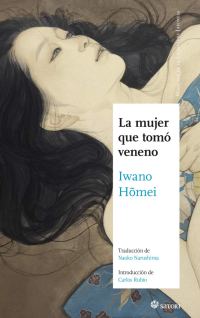
Review of the book “The Woman Who Took Poison” by Iwano Homei
The Woman Who Drank Poison is a short novel by the Japanese writer Iwano Homei, published in 1912. The work tells the story of Yoshio Tamura, a married writer who falls in love with a geisha named Oyuki, with whom he maintains a stormy and destructive relationship. Tamura feels trapped in a social system that imposes on him the duty to provide for his family and obey the moral standards of the Meiji era, while Oyuki is a rebellious and lying woman who does not conform to the status of concubine. she. The novel shows the conflict between tradition and modernity, between love and hate, between life and death, in a Japan that faces the changes caused by Western influence.
The novel is divided into two parts: Dissipation and The Woman Who Took Poison. In the first part, Tamura meets Oyuki in a geisha neighborhood and is fascinated by her personality. Despite being married and having a child, Tamura decides to buy Oyuki’s freedom to make her her lover. However, he soon discovers that Oyuki is not the ideal woman he imagined, but rather a selfish, capricious and dishonest person, who constantly lies to him and makes him spend all her money. Tamura feels guilty for cheating on his wife and neglecting his writing work, but he can’t give up on Oyuki.
In the second part, Tamura and Oyuki live together in a rented house, but their relationship becomes increasingly violent and unhealthy. Tamura realizes that Oyuki does not love him, but that she only uses him to satisfy her material and sexual needs. Oyuki insults him, humiliates him and threatens to commit suicide if he abandons her. Tamura feels trapped in a vicious cycle from which he cannot escape. One day, Oyuki fulfills his threat and takes poison in front of him. Tamura tries to save her by taking her to the hospital, but it’s too late. Oyuki dies in her arms, leaving him alone with her remorse and emptiness.
Iwano Homei’s novel is a masterpiece of modern Japanese literature, reflecting the existential drama of a man searching for love in a society that oppresses and alienates him. The novel has a realistic and psychological style, which describes in detail the feelings and thoughts of the characters. The novel also has a social and cultural background, showing the contrast between traditional Japan and Westernized Japan, between romantic idealism and pragmatic materialism, between beauty and decadence. The novel is a critique of the moral hypocrisy and social corruption of the Meiji era, which caused the suffering and despair of many people.
**
Iwano Homei’s narrative style is captivating and immersive, allowing the reader to immerse themselves in Yoshio’s life and experience his emotions and internal conflicts. The novel is written in first person, which allows the reader to have a deeper connection with the protagonist and understand her most intimate thoughts and feelings.
One of the highlights of “The Woman Who Took Poison” is the way Homei addresses topics such as machismo, oppression, and gender inequality. Through Yoshio’s story, the author shows how women of the time were treated as objects and how their lives were controlled by the expectations and social norms imposed by men.
Furthermore, the novel also explores themes such as loneliness, despair, and the search for freedom and happiness. As the protagonist confronts her problems and struggles to find meaning in her life, the reader witnesses her growth and evolution as a character. Yoshio’s story is a reflection of the struggle of many women in similar situations, which makes the novel even more moving and relevant.
As for the supporting characters, Homei creates a diverse and complex cast that enriches the plot and brings different perspectives to the story. Each character has their own motivations and conflicts, which makes the novel more interesting and dynamic.
Overall, “The Woman Who Drank Poison” is a powerful novel that addresses topics such as depression, suicide, oppression of women, and lack of communication in relationships. Even though it was written over a century ago, the story is still relevant and moving today. I would recommend this novel to anyone interested in Japanese literature or issues related to mental health and society.
Source: https://algunoslibrosbuenos.com/la-mujer-que-tomo-veneno

